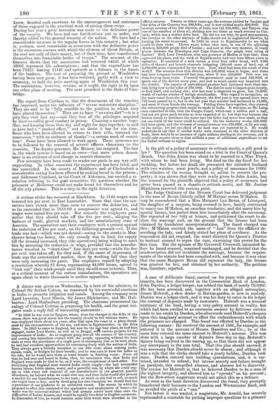The report from Chatham is, that the demeanour of the
convicts has improved, under the influence of "severe restrictive discipline." They are said to be "fully sensible to the position in which they have placed themselves." They are to have "no extra diet"—it is a pity they ever had any—and they lose all the privileges acquired by their so-called good conduct in prison. Chaining a number toge- ther, and keeping them thus day and night for days together, is said to have had a "marked effect," and no doubt it has for the time. Some who have been allowed to return to their cells, received the concession "with an outburst of thanks"—a certain mark of contri- tion! Some have been allowed to work again. These measures are to be followed by the removal of several officers obnoxious to the convicts. The deputy-governor, Mr. Measor, has resigned. The fact is, the whole system is based on an error—that mere prison demea- nour is an evidence of real change in convict character.
Few attempts have been made to render our gaols in any way self- supporting. In other countries the experiment has been tried, and has succeeded. In the county of Middlesex and at Chelmsford a considerable saving has been effected by making bread in the prisons; and Alderman Copeland, in the Court of Aldermen, has carried a re- solution referring to the gaol committee the question whether the prisoners at Holloway could not make bread for themselves and for all the city prisons. This is a step in the right direction.






























 Previous page
Previous page